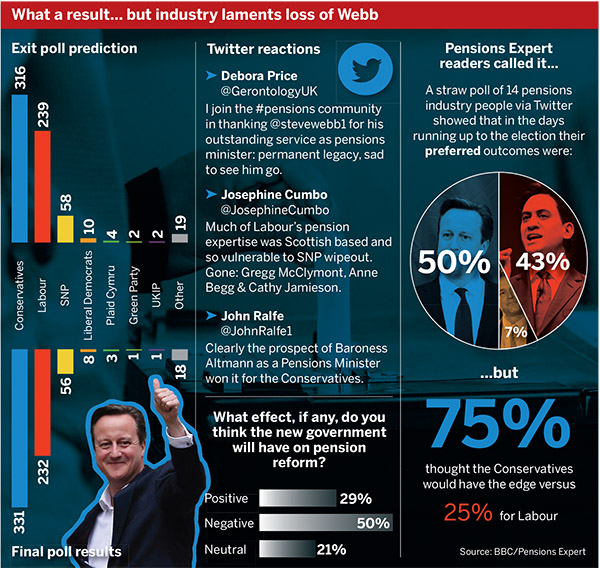General election 2015: The Conservatives’ election triumph on Friday, alongside a near whitewash by the Scottish National party north of the border, has raised several questions about how the fallout will affect pensions.
In an election race billed as too close to call, Labour suffered a battering as the Tories exceeded even their own expectations, banjaxing Labour leader Ed Miliband’s ambitions and trouncing the Liberal Democrats.
While the main parties’ campaign manifestos showed a general consensus on certain pensions issues, such as tax relief, the industry had expressed concern that a Labour government could move to rein in some of the pension freedoms.

Industry reaction
Pollsters had the Conservatives and Labour largely neck-and-neck up until the exit poll at 10pm on Thursday.
Roger Mattingly, director at Pan Trustees said 316 seats for the Conservatives had initially seemed optimistic. “It was understated,” he said.
But Mattingly added that the Conservative majority would provide some comfort for the industry as many feared Labour would water down the reforms.
“It’s a relief [for] freedom and choice and all that’s gone in,” he said. “The good news is it won’t be… tinkered with or unravelled.”
Mattingly added the increased certainty would give providers more confidence in devoting money to product development, knowing regulations are unlikely to be changed.
While the extent of the election outcome surprised many, the pensions industry showed signs it expected the Conservatives to remain in power in some form.
In the two days leading up to the election, a Pensions Expert straw poll via Twitter of 14 pensions industry people showed that while half preferred a Tory win (with 43 per cent favouring Labour and 7 per cent Lib Dem) three-quarters believed the Conservatives would have the edge, versus 25 per cent for Labour.
One Conservative-leaning respondent said the party was “more likely to achieve economic stability”, while another said the Tories were the best choice for pensions as the industry “needs to be regulated more with information”.
Pensions tax relief is almost the low-hanging fruit for getting some money into the coffers of the government given the size of the deficit
Arron Slocombe, Baker & McKenzie
And on Labour’s side, one respondent simply said they “don’t trust the Tories”, while another chose Labour because “they will sort out the mess for middle and low-income people created by freedom and choice bigotry.”
Referendum talk
A Conservative majority has opened the way for a referendum on European Union membership. Simon Hill, chief investment officer at Buck Consultants, said this could negatively affect UK markets.
He said: “If it looks like the UK was going to leave the EU it would be bad for gilts and equities.”
Pension pledges
Plans to overhaul tax relief, revealed in the Conservative party manifesto earlier this month, could be mobilised rapidly.
The Tories plan to restrict tax relief for high earners to fund an increase of the inheritance tax threshold to £1m.
Arron Slocombe, partner at law firm Baker & McKenzie, said he thought the new government would bring in the changes sooner rather than later.
“Pensions tax relief is almost the low-hanging fruit for getting some money into the coffers of the government given the size of the deficit,” said Slocombe.
But he added: “If there is going to be complexity [we need] to ensure we have proper time to consider it and have a proper consultation.
It is therefore important that we have another enthusiastic pensions minister who will see these initiatives through to the end – rather than a short term ‘journeyman’ keen for a promotion
Duncan Buchanan, Society of Pension Professionals
“The main challenge will be working through the consultation so we don’t bake into the system errors which could have been avoided.”
Pensions minister
As Steve Webb has lost his seat, speculation has already begun over who the new pensions minister might be, and some fear a return to the revolving-door reputation that dogged the post prior to Webb’s arrival.
In a press statement, Duncan Buchanan, president of the Society of Pension Professionals, said getting the right person for the job would be key at such a critical time of change in the industry.
He added: “It is therefore important that we have another enthusiastic pensions minister who will see these initiatives through to the end – rather than a short term ‘journeyman’ keen for a promotion to the department of agriculture and rural development.”
Many people on social media have predicted financial secretary to the Treasury David Gauke as a possible candidate, while Ros Altmann – who the Tories plan to confirm as minister for financial inclusion and protection* – is expected to play a wider role.
One pensions industry figure, who did not wish to be named, said: “I’d be amazed if she wasn’t part of the group that makes that decision.”
Altmann said a great deal had already been done to take pensions in a better direction but there is more to do.
“Both state and private pensions are working much better than before and now we need to ensure the progress continues,” Altmann said.
“Some adjustments may be required and certainly we need more attention to fair value for money, customer protection and financial education.”
*The original version of this article mistakenly said the Tories had confirmed her in this role.

















